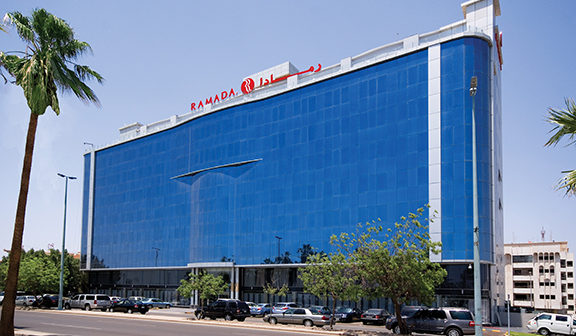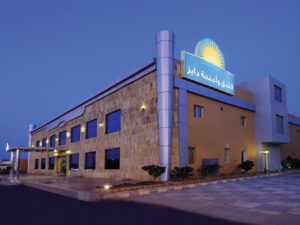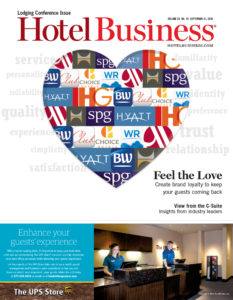SAUDI ARABIA—In a market dominated by luxury and five-star hotels, a new report by TOPHOTELPROJECTS disclosed that Saudi Arabia’s hospitality industry is undergoing a notable shift towards the development of midscale hotels for 2016. This year, 15 projects and 4,630 rooms in Saudi Arabia’s pipeline are midscale: Four of the projects are in early planning; five projects are scheduled to start in the next 12 months; and six projects are under construction. In 2015, there were six midscale projects in the works, nearly doubling year-over-year development, according to Lodging Econometrics.
The city of Jeddah leads the market with seven projects and 1,603 rooms completed, a true sign of growth from 2015 when the metropolis had two projects and a total of 319 rooms in its pipeline. The religious city of Makkah leads the country in year-to-year increases in ADR at $203.46 (763.04 Saudi Arabian Riyals [SAR]) up 14.1% over 2015, compared to Jeddah’s 2.5% ADR increase of $255.35 (957.51 SAR); and RevPAR at $145.13 (544.27 SAR), up 19.7% in comparison to a 4.1% decrease in Jeddah’s RevPAR of $179.22 (672.12 SAR). Occupancy in Makkah is up 4.9%, compared to Jeddah with a 6.4% decrease. All performance data was supplied by STR, Inc.’s trend report.
“There’s been a lot of demand for midscale development. While the market has been dominated by luxury, times have changed. The growing middle class in Saudi Arabia cannot afford luxury rooms,” said Michael Zager, regional VP, Middle East and Africa, Wyndham Hotel Group.
The Kingdom of Saudi Arabia (KSA) is ruled under an absolute monarchy that monitors the behavior of its citizens and guests under Sharia Law. Leisure travel is also closely watched. Citizens from other nations on the Arabian Peninsula can travel there for a host of reasons, while other nationals, including Europeans and Americans, may travel to Saudi Arabia for religious or family purposes, or business travel. According to Zager, major drivers fueling leisure and business travel to top-destination cities are religious tourism, large meeting facilities and oil; Saudi nationals’ enjoyment of travel is also a factor.
With a direct hit to the target market, it may behoove prospective owners to develop in this blossoming sector as opposed to luxury, according to Zager. An added benefit for developers is the thought that Saudi Arabians greatly appreciate American brands. Zager commented on the age-old paradigm that the service industry is well accepted in this part of the world, as hospitality is a top sign of respect in the personal, household and business realms.
The TOPHOTELPROJECTS report, commissioned by The Hotel Show Saudi Arabia 2016, stated “six out of the top-10 brands with the most development currently underway throughout KSA are classed as midmarket,” according to Lodging Econometrics. Leading the pack is Four Points by Sheraton (1,890 rooms); Park Inn by Radisson (1,433 rooms); Hilton Garden Inn (1,155 rooms); Aloft Hotels (627rooms); Staybridge Suites (538 rooms); and Mercure (528 rooms).
Rezidor Hotel Group, a top Saudi Arabian developer for 2016, has nine hotels and more than 1,400 rooms in Saudi Arabia; within the next three years, its pipeline will include 22 hotels and over 4,500 rooms under development, according to Elie Milky, head of business development, Middle East, Rezidor Hotel Group. Their reach across Saudi Arabia represents 12 cities, including well-known metropolitan areas as well as lesser-known industrial cities.
Rezidor Hotel Group sees KSA as having strong investment potential. “Saudi Arabia is a regional powerhouse with a self-sustained economy that is increasingly diversifying its economic offering to reduce its reliance on oil. Its relatively under-developed tourism offering, strong and ever-increasing domestic, religious and corporate demand for quality hotel accommodations, under-developed regional and secondary cities, and the extension of wealth with infrastructure developments and economic, educational and industrial zones across the four corners of KSA, have all attracted owners, investors and developers to tap into this potential,” Milky disclosed. “Its religious tourism market alone, with Makkah and Madinah, sees much more room for growth as it is seen as the most resilient and continuously growing type of demand worldwide.”
While tensions in the area could be seen as a risk, Rezidor sees a bright future for the country, now ruled by King Salman bin Abdulaziz al Saud, with a vision focused on economic growth in commodities other than oil. “The risk of doing business in KSA has more recently been geopolitical factors such as tensions with Iran, involvement in regional events, the war in Yemen and the drop in the price of oil. We believe the Kingdom could reduce the impact of these challenges as we expect positive developments on the geopolitical front, as well as a gradual recovery in the price of oil. Most importantly, Saudi Arabia has begun accelerating its diversification strategy away from oil with its recently launched 2030 vision,” Milky explained. He also said Rezidor is part of the 2030 strategy with hotels in operation and under development in the secondary cities and industrial zones of Jizan, Najran, Dammam and Jubail.
American brand Best Western is considered midscale, although it has other projects in the upper-midscale and upscale segments. Branded hotels exist in Riyadh, Dammam and Jizan, according to Karl de Lacy, international development director for Best Western Hotels & Resorts. He said the company expects to open a hotel in Jeddah. “In every market there is a demand for different categories of hotels. Domestic and regional travel need alternative options to the luxury hotels and, in many cases, our Best Western hotels are recognized as internationally branded hotels and chosen based on this access to earn rewards through our loyalty club.”
He added that there has been a scaling back in regard to KSA’s influence on the development of tourism and the hotel market “There are always going to be external influences on development opportunities. There is certainly an appetite for continued development, but for smaller projects,” he said.
According to Lodging Econometrics, another addition to the midmarket pipeline are Accor’s Novotel (450 rooms), Adagio Aparthotel (77 rooms) and Ibis & ibis Styles (463 rooms), all slated to open in 2016 and 2017.
Moreover, Lodging Econometrics reported that InterContinental Hotels Group’s (IHG) Holiday Inn brand is one of the largest brands in KSA with 11 hotels open. In 2015, Holiday Inn signed its largest worldwide hotel, Holiday Inn Makkah Abraaj Al Tayseer, and opened another two in the region.
With religious tourism on a consistent rise, business travel steady and the prospect of leisure travel from diverse countries on the horizon, midscale hotel brands could benefit from the trend. HB



